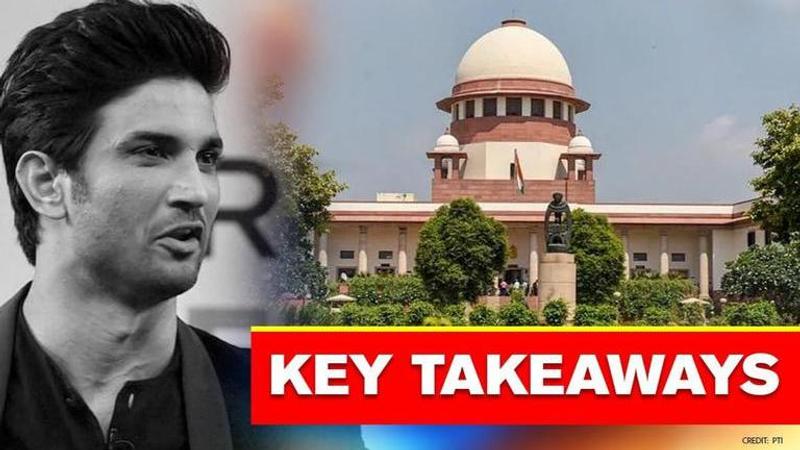Published 17:28 IST, August 19th 2020
Sushant death case: As SC approves CBI probe, here are 5 key takeaways from the verdict
Amid an overwhelming campaign seeking justice for Sushant Singh Rajput, the SC approved the CBI probe in the case. Here are 5 key takeaways from the verdict.

Amid an overwhelming campaign seeking justice for Sushant Singh Rajput, the Supreme Court bench comprising Justice Hrishikesh Roy on Wednesday approved the ongoing CBI probe based on the Patna Police FIR. Moreover, it directed the CBI to probe any other case registered on the Chhichhore actor’s death and the surrounding circumstances. At the same time, Justice Roy clarified that the conclusion and observations in this order are only limited to the disposal of Rhea Chakraborty’s transfer petition.
Here are the 5 key takeaways from the verdict:
-
Suspicion on Mumbai Police’s role
Though the Maharashtra government and leaders of the ruling coalition in the state have vociferously defended the Mumbai Police probe, the apex court cast aspersion on one crucial aspect. It held that that the obstruction of the Bihar Police team gave rise to the suspicion on the independent nature of Mumbai Police’s probe. However, it maintained that the records produced before the court do not suggest any wrongdoing by the Mumbai Police.
In paragraph 10 of the order, Justice Roy wrote, “In the instant case, the petitioner repose confidence on Mumbai police. The records of the case produced before this Court, does not prima facie suggest any wrong doing by the Mumbai Police. However, their obstruction to the Bihar police team at Mumbai could have been avoided since it gave rise to suspicion on the bonafide of their inquiry.”
-
The limited scope of the Mumbai Police’s inquiry
As per the verdict, the apex court revealed that Mumbai Police was conducting a “limited inquiry” into the cause of Sushant’s unnatural death under Section 174 of the Code of Criminal Procedure. According to Justice Roy, this is not equivalent to that of an “investigation” as neither had an FIR been registered nor had the Mumbai Police referred the matter to the nearest Magistrate having jurisdiction. Therefore, it concluded that it is “premature” to suggest that the Mumbai Police is carrying out a parallel investigation.
“The Mumbai Police has attempted to stretch the purview of Section 174 without drawing up any FIR and therefore, as it appears, no investigation pursuant to commission of a cognizable offence is being carried out by the Mumbai police. They are yet to register a FIR. Nor they have made a suitable determination, in terms of Section 175(2) CrPC. Therefore, it is pre-emptive and premature to hold that a parallel investigation is being carried out by the Mumbai Police,” the court noted in paragraph 20.
-
Patna Police committed no illegality
In paragraph 23 of the judgment, the top court stated, “Registration of FIR is mandated when information on cognizable offence is received by the police. Precedents suggest that at the stage of investigation, it cannot be said that the concerned police station does not have territorial jurisdiction to investigate the case”. It added that the allegation of criminal breach of trust and misappropriation of money could indicate the lawful jurisdiction of the Patna Police. Maintaining that the Bihar Police was not required to transfer the FIR to the Mumbai Police at that stage of the investigation, the bench concluded that the Bihar government was competent to give consent for the entrustment of the probe to the CBI.
-
SC’s power in directing CBI probe can’t be fettered
The SC verdict reiterated that the powers of Constitutional Courts cannot be fettered in ordering a CBI investigation. This assumes significance as the CBI cannot conduct an investigation without the consent of the concerned state as mandated by Section 6 of the Delhi Special Police Establishment Act. To protect the credibility of the probe and the investigative authority, the apex court backed the role of an independent agency, not controlled by either the Bihar or Maharashtra government. Justice Roy also acknowledged the apprehension regarding the possibility of an unfair investigation.
In paragraph 35, the SC said, “While the steps taken by the Mumbai police in the limited inquiry under Section 174 CrPC may not be faulted on the material available before this Court, considering the apprehension voiced by the stakeholders of unfair investigation, this Court must strive to ensure that search for the truth is undertaken by an independent agency, not controlled by either of the two state governments.”
-
The necessity of unbiased probe underscored
Acknowledging the tremendous talent of Rajput, the SC took account of the fact that his family, friends, and admirers are waiting for the outcome of an impartial investigation so that all speculations can be put to rest. At this juncture, Justice Roy recalled that Rhea Chakraborty had herself called for a CBI investigation. The apex court asserted that an unbiased probe will result in justice for innocent persons and shall bolster the faith of the common man in the judicial process.
“When truth meets sunshine, justice will not prevail on the living alone but after Life’s fitful fever, now the departed will also sleep well. Satyameva Jayate,” Justice Roy emphasised in paragraph 40 of the verdict.
Updated 17:28 IST, August 19th 2020




